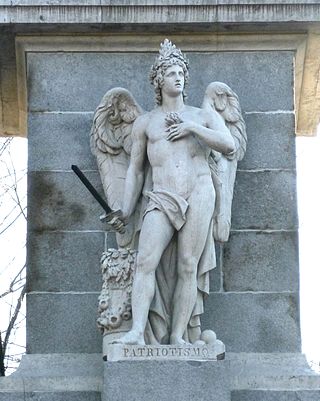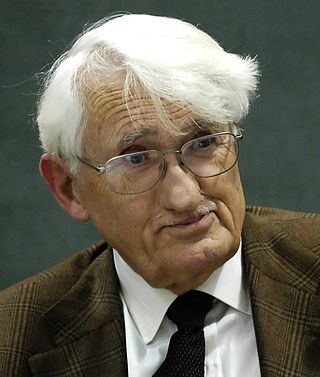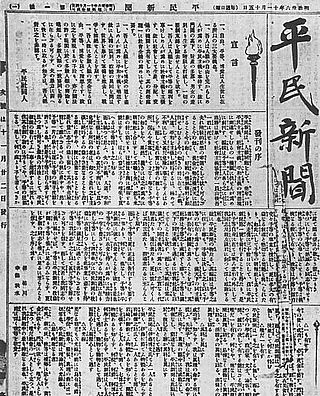
Patriotism is the feeling of love, devotion, and a sense of attachment to one's country. This attachment can be a combination of different feelings for things such as the language of one's homeland, and its ethnic, cultural, political, or historical aspects. It may encompass a set of concepts closely related to nationalism, mostly civic nationalism and sometimes cultural nationalism.

Kōtoku Denjirō, better known by the pen name Kōtoku Shūsui , was a Japanese socialist and anarchist who played a leading role in introducing anarchism to Japan in the early 20th century. Historian John Crump described him as "the most famous socialist in Japan".
Korean nationalism can be viewed in two different contexts. One encompasses various movements throughout history to maintain a Korean cultural identity, history, and ethnicity. This ethnic nationalism was mainly forged in opposition to foreign incursion and rule. The second context encompasses how Korean nationalism changed after the partition in 1945. Today, the former tends to predominate.
Anarchism and nationalism both emerged in Europe following the French Revolution of 1789 and have a long and durable relationship going back at least to Mikhail Bakunin and his involvement with the pan-Slavic movement prior to his conversion to anarchism. There has been a long history of anarchist involvement with nationalism all over the world as well as with internationalism.

The Amakasu Incident was the murder of two prominent Japanese anarchists and their young nephew by military police, led by Lieutenant Amakasu Masahiko, in September 1923. The victims were Ōsugi Sakae, an informal leader of the Japanese anarchist movement, together with the anarcha-feminist Itō Noe, and Ōsugi's six-year-old nephew.
The High Treason Incident, also known as the Kōtoku Incident, was a socialist-anarchist plot to assassinate the Japanese Emperor Meiji in 1910, leading to a mass arrest of leftists, and the execution of 12 alleged conspirators in 1911.

Constitutional patriotism is the idea that people should form a political attachment to the norms and values of a pluralistic liberal democratic constitution rather than to a national culture or cosmopolitan society. It is associated with post-nationalist identity because, while it is seen as a similar concept to nationalism, the attachment is based on the constitution rather than on a national culture. In essence, it is an attempt to re-conceptualize group identity with a focus on the interpretation of citizenship as a loyalty that goes beyond individuals' ethnocultural identification. Theorists believe this to be more defensible than other forms of shared commitment in a diverse modern state with multiple languages and group identities. It is particularly relevant in post-national democratic states in which multiple cultural and ethnic groups coexist. It was influential in the development of the European Union and a key to Europeanism as a basis for multiple countries belonging to a supranational union.
Post-colonial anarchism is a term used to describe anarchism in an anti-imperialist framework. Whereas traditional anarchism arose from industrialized Western nations—and thus sees history from their perspective—post-colonial anarchism approaches the same principles of anarchism from the perspective of colonized peoples. It is highly critical of the contributions of the established anarchist movement, and seeks to add what it sees as a unique and important perspective. The tendency is strongly influenced by indigenism, anti-state forms of nationalism, and anarchism among ethnic minorities, among other sources.
Anarchism in Japan began to emerge in the late 19th and early 20th centuries, as Western anarchist literature began to be translated into Japanese. It existed throughout the 20th century in various forms, despite repression by the state that became particularly harsh during the two world wars, and it reached its height in the 1920s with organisations such as Kokuren and Zenkoku Jiren.
Left-wing nationalism or leftist nationalism is a form of nationalism which is based upon national self-determination, popular sovereignty, and left-wing political positions such as social equality. Left-wing nationalism can also include anti-imperialism and national liberation movements. Left-wing nationalism often stands in contrast to right-wing politics and right-wing nationalism.
Among scholars of nationalism, a number of types of nationalism have been presented. Nationalism may manifest itself as part of official state ideology or as a popular non-state movement and may be expressed along civic, ethnic, cultural, language, religious or ideological lines. These self-definitions of the nation are used to classify types of nationalism. However, such categories are not mutually exclusive and many nationalist movements combine some or all of these elements to varying degrees. Nationalist movements can also be classified by other criteria, such as scale and location.

Heimin Shinbun was a socialist and anti-war daily newspaper established in Japan in November 1903, as the newspaper of the Heimin-sha group. It was founded by Kōtoku Shūsui and Sakai Toshihiko, as a pacifist response to the approaching Russo-Japanese War. When the newspaper that Kōtoku and fellow socialist Sanshirō Ishikawa had worked for, Yorozu Chūhō, endorsed the war, they resigned in protest to form the group.

Black Flame: The Revolutionary Class Politics of Anarchism and Syndicalism is a book written by Lucien van der Walt and Michael Schmidt which deals with “the ideas, history and relevance of the broad anarchist tradition through a survey of 150 years of global history.”
Socialist patriotism is a form of patriotism promoted by Marxist–Leninist movements. Socialist patriotism promotes people living within Marxist–Leninist countries to adopt a "boundless love for the socialist homeland, a commitment to the revolutionary transformation of society [and] the cause of communism". Marxist–Leninists claim that socialist patriotism is not connected with nationalism, as Marxists and Marxist–Leninists denounce nationalism as a bourgeois ideology developed under capitalism that sets workers against each other. Socialist patriotism is commonly advocated directly alongside proletarian internationalism, with communist parties regarding the two concepts as compatible with each other. The concept has been attributed by Soviet writers to Karl Marx and Vladimir Lenin.

Political dissidence in the Empire of Japan covers individual Japanese dissidents against the policies of the Empire of Japan.

Anti-imperialism in political science and international relations is opposition to imperialism or neocolonialism. Anti-imperialist sentiment typically manifests as a political principle in independence struggles against intervention or influence from a global superpower, as well as in opposition to colonial rule. Anti-imperialism can also arise from a specific economic theory, such as in the Leninist interpretation of imperialism, which is derived from Lenin's 1917 work Imperialism, the Highest Stage of Capitalism. People who categorize themselves as anti-imperialists often state that they are opposed to colonialism, colonial empires, hegemony, imperialism and the territorial expansion of a country beyond its established borders.
Anti-monarchism in Japan was a minor force during the twentieth century.
Sanshirō Ishikawa was a Japanese Christian, socialist, and anarcho-syndicalist who was influential in the Japanese anarchist movement during the 20th century. He wrote under the pen-name Asahiyama and was a contributor of first Japanese socialist women's newspaper, Sekai Fujin.

Sakutarō Iwasa was a Japanese anarchist who was involved in the Japanese anarchist movement during the 20th century. Living until the age of 87, he was significant in influencing Japanese anarchists towards his anarcho-communist variety of 'pure' anarchism.

Heimin (平民) is the Japanese word for commoner. The word first came into use towards the end of the Edo period to denote people who were born without any social privileges, contrasting them with shizoku. Heimin mostly consisted of farmers, artisans and merchants.









